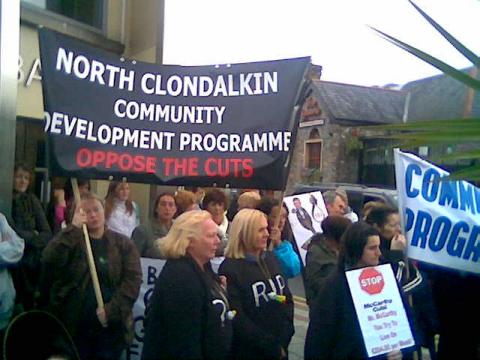Community sector faces challenges

The community sector is a key part of our equality infrastructure but is facing many battles. By Niall Crowley.
The community sector is an infrastructure that also encompasses equality legislation, statutory equality bodies, national strategy plans, and equality mainstreaming. This is the infrastructure that drives forward the search for a more equal society. The closures, cutbacks and loss of independence that have been visited on the community sector can only reflect a Government that believes equality is not important.
The community sector is a key part of our democracy. Representative politics is confined to a narrow and homogeneous group. There is little space for women, working class people, black and minority ethnic people and others who experience inequality. The community sector offers space to those people who experience inequality to identify their shared interests, to articulate those interests and to advocate for a response to their situation and experience. The damage being inflicted on the community sector damages our democracy.
The community sector also has to be conscious of the internal threats posed when community development becomes a job, community organization becomes a service and the community sector becomes divided by competition and agendas. It needs to emphasise its activist roots, assert its commitment to equality and the radical social change a more equal Ireland requires, and contribute to the emergence of a social movement for this more equal Ireland.
In this context of external hostility and internal threat, there are a number of battles to be engaged in by the community sector. A range of community organisations are already engaged in these battles.
There is the battle for survival. Community organisations and activists need to campaign for adequate funding for the sector, to ensure the independence of the sector and to sustain the role of advocacy played by the sector.
There is a cultural battle. The sector needs to be a vocal champion of equality, to offer analysis of the current economic situation from an equality perspective and to promote alternative responses to economic crisis. In this battle the sector needs to break with the culture of fear that has accompanied this economic recession, a media dominance that seeks to suggest there is no alternative and the culture of backlash that insists now is not the time for equality.
There is a political battle. Equality does not have sufficient traction in popular opinion. Fairness dominates the political discourse. Fairness is an inadequate ambition with which to seek to tackle the deep and systemic inequalities in our society. The community sector needs to create a new political space such that politicians will need to espouse equality if they are to get votes.
Finally there is a strategy battle. The community sector needs to demand a renewed equality infrastructure. This new infrastructure would address issues of inequality in access to resources, to recognition and status and to influence and power in an integrated manner. It would seek to achieve new outcomes for groups experiencing inequality, to advance equality and to secure a valuing of difference. It would mark a new ambition in place of the current focus on opportunity, fairness and tolerance.
Niall Crowley is an independent equality consultant. He was chief executive officer of the Equality Authority in Ireland
from its establishment in 1999 until 2009. Prior to this he worked in the community sector with the Travellers' rights organisation Pavee Point for twelve years. He is the author of 'Empty Promises: How the Equality Authority was Brought to Heel' published by A&A Farmar in 2010.
